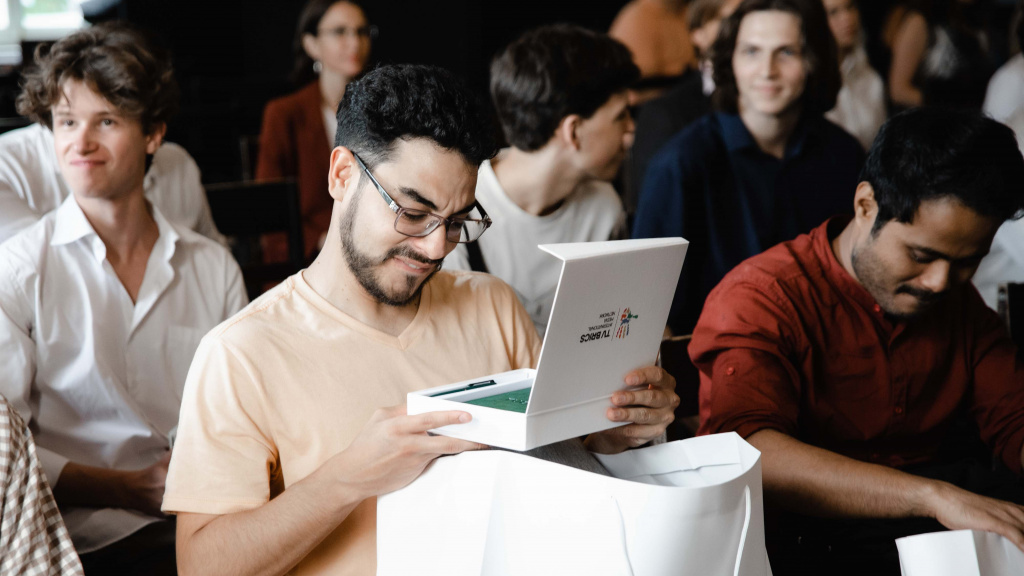Participants of the InteRussia fellowship programme for foreign theatre professionals, organised at the Russian Institute of Theatre Arts – GITIS, visited the headquarters of TV BRICS.
During the presentation, the participants were introduced to the work of the International Media Network and told about its role in disseminating objective information about the BRICS+ countries. The guests were also introduced to the process of preparing exclusive reports, stories, programmes, documentaries and news. In addition, the foreign guests learnt about TV BRICS international projects, as well as about the functioning of its partner network, which currently includes more than 70 media outlets from more than 20 countries.
Director of TV BRICS International Cooperation Department, Daria Ivankova, noted that establishing partnerships with foreign colleagues is among the priority tasks of the International Media Network.
“TV BRICS actively promotes the information agenda not only of the countries that are members of the association, but also of the BRICS+ countries. This is possible thanks to close co-operation with the national media of Africa, Asia and Latin America. We are very pleased that in the year of Russia’s presidency in the group, artists from BRICS+ countries have an opportunity to see first-hand how the processes are set up, to understand how content is exchanged and further adapted into five languages. I am sure that such fellowships will continue to strengthen international cultural and humanitarian co-operation”

Daria Ivankova Director of TV BRICS International Cooperation Department
In turn, the participants shared their impressions of visiting Russia and getting acquainted with Russian culture. In their opinion, the projects implemented with the participation of TV BRICS allow residents of the BRICS countries to get to know each other better.
In particular, for South African actor Nahum Hughes, the fellowship in Moscow turned out to be his first trip to Russia.
“When I came to Russia, I discovered many interesting and new things. Long history and rich culture are combined with innovative architecture and modern technologies of the transport system. I was particularly impressed by the Russian theatre,” said the trainee.
Ma Xiwei, an actress from China, noted the professionalism of GITIS teachers and the serious level of training at the institution.
“I am very happy to have the opportunity to study in Russia, to get acquainted with mentors from GITIS. My teachers in Shanghai believe that you can learn a lot from Russian masters,” she said.

For Abhijeet Kumar Sinha from India, the opportunity to compare the theatre traditions of this country with Russian practice was valuable.
“The Indian school is characterised by impulsiveness, bright colours, a lot of songs and dances. And the Russian system is more about immersion inside the character, natural performance and working on the psychological component of the role,” said the artiste.
His colleague Mayur Parmar added that the participants of the fellowship were able to get acquainted not only with the traditions of Russian theatre, but also with the peculiarities of artistic art of other countries. At the same time, he drew attention to the ease of communication between students and teachers.
“We are all actors, our first language is the language of art, so we don’t have any barriers. Besides, thanks to the work of interpreters, we understand the teachers perfectly,” said the trainee.
The actors also visited the Gorchakov Public Diplomacy Fund, a partner of TV BRICS. Representatives of the institution told the participants about the missions and tasks of the foundation in the sphere of building international humanitarian relations. The presentation also talked about the implementation of social, cultural and educational projects of the organisation.
“For all the time of InteRussia’s existence, we have organised fellowships in various areas: from international relations to energy. However, the theatre arts programme is the first for us, so we treat its participants with special trepidation. Theatre is a kind of cultural code, capable of conveying deep meanings and emotions without words, through the universal language of gestures, facial expressions and plasticity. It reflects the soul of the people, their history and worldview. I think Russian theatre with its rich traditions is of particular interest to foreign colleagues”

Liana Dymova Coordinator of Scientific Programmes at the Gorchakov Public Diplomacy Fund
The InteRussia international fellowship programme has been running since 2021. The event for actors is held for the first time in the Year of Russia’s BRICS Chairmanship. The project involves artists from Argentina, Brazil, China, India, Iran and South Africa. Lectures and master classes from leading teachers of GITIS have been organised for them. The aim of the initiative is to improve the professional skills of foreign artists, introduce them to Russian theatre and culture, and promote a positive image of Russia abroad.
The fellowship was developed jointly with the TV BRICS International Media Network and GITIS. The project is implemented by the Gorchakov Public Diplomacy Fund with the support of the Presidential Grants Fund.
Photo: Melissa Filipchik


